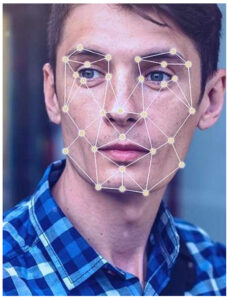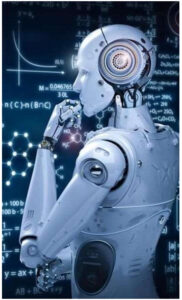~ SAMYAK ZAVERI
- Big Data ● Machine Learning ● Artificial Intelligence
 Welcome to the world of data science, where every single digital interaction with your life, be it the time you wake up or go to bed is of utmost importance. When you read an article online? It’s data. When you stream a song, series, or podcast? Again, data. Every time you walk down the road with a phone in your pocket, your location tracked via GPS sensors is just fostering data. This is the age of data where firms around the world have access today to more points of information than at any other time in human history.
Welcome to the world of data science, where every single digital interaction with your life, be it the time you wake up or go to bed is of utmost importance. When you read an article online? It’s data. When you stream a song, series, or podcast? Again, data. Every time you walk down the road with a phone in your pocket, your location tracked via GPS sensors is just fostering data. This is the age of data where firms around the world have access today to more points of information than at any other time in human history.
It is these data points that enable many organizations to make informed decisions. Have you ever wondered how Google manages to always show advertisements that entice you? It uses your surfing history to filter out your likes and dislikes and then shows those advertisements which are close to your heart.The process is completely data driven. But what exactly is data science?
“Data science is an interdisciplinary field that uses scientific methods, processes, algorithms, and systems to extract information and insights from many structural and unstructured data”.
Source:
https://www.datamation.com/big-data/structured-vs-unstructured-data.html
https://towardsdatascience.com/what-is-data-science-and-what-is-it-not-c6a09d735f02
 To put it simply, Data science is a method of making efficient data-driven decisions. It comprises of everything right from the point of data collection to decision making. Unstructured data is data that’s not structured via predefined data models and it contains data that cannot be simply filtered or altered. Structured data is the data that adheres to a pre-defined data model with data in an organized manner and thus easy to analyze.
To put it simply, Data science is a method of making efficient data-driven decisions. It comprises of everything right from the point of data collection to decision making. Unstructured data is data that’s not structured via predefined data models and it contains data that cannot be simply filtered or altered. Structured data is the data that adheres to a pre-defined data model with data in an organized manner and thus easy to analyze.
Structured data is much easier for Big Data programs to digest, whereas the myriad formats of unstructured data create a greater challenge. Big Data relates to datasets too large to be handled by conventional data processing software. Nonetheless, each sort of data plays a key role in effective data analysis. Data Science is spread out in many different branches, including machine learning, data mining and data visualization.
When we say computers, very often what comes to our mind is writing a piece of code or program and telling the computer step by step what to do, but in machine learning, we have a tendency not to do this. The system learns on its own, and we just provide the past data often called as labeled data and the system learns during the process, what we know as the training process. We tell the system whether the outcomes are right or wrong and that feedback is taken by the system and it corrects itself and it learns till it gives the correct output for most of the cases. It won’t be 100% correct however it aims to induce as correct as potential.
WHAT ARE MACHINE LEARNING ALGORITHMS?
Machine learning is the latest buzzword, and a word that we all have come across at one point of time. To understand it, let’s begin with a simple example. The screen lock on your phone that uses facial recognition, in turn uses machine learning. Your face is detected and an image of it is captured. The software reads your countenance. The algorithm verifies your face by cryptography to convert into a facial signature and then an assessment is made. Voice recognition is another arena of machine learning, with Siri as the best example. Machine learning helps in making computers learn and act like humans by feeding data and information without being explicitly programmed.
Now that we learned so much about data science, let’s learn about the role of a data scientist. In brief, the role focuses on the analysis and management of data, although dependent on the area that the corporate is specialized in. A skilled Data Scientist is savvy enough to dig out meaningful information from data, no matter what it is and where it comes from. He uses his analytical aptitude to resolve business problems. This requires the Data Scientist to have domain knowledge of that particular industry. Let’s talk about few top industries where the role of data scientist is crucial.
Source:
https://labelyourdata.com/articles/facial-recognition-algorithms-for-machine-learning/
https://www.securityinformed.com/insights/evolution-facial-recognition.html
Healthcare & pharmaceuticals: This industry is booming since the covid-19 pandemic. For the development of vaccine there are different stages of clinical trials. Firms need to make sure that they have the right mix of patients for the trial. A data scientist can assist in identifying the appropriate patients to participate in a trial through analysis of past data and even help to identify potential side effects before they become a reality. Data scientists also help to accelerate drug discovery, target specific patient populations and to get marketing & sales insights.
Telecommunication: This industry has most cases of fraudulent activity like illegal access, faux profiles, etc. By applying machine learning algorithms to the customer data, the industry can avoid any kind of fraud. The algorithms detect anomalies and with the assistance of data visualization techniques, present them as alerts to the analysts in real-time. Information on customer preferences and desires gives a better understanding of the customer. Predictive analytics uses historical data to build forecasts. The better is the quality of the past data, the better is predictability. Data science is additionally concerned with customer segmentation, lifetime value prediction, network management and product development. Insurers can have better consumer targeting and product design. Analysis of internet search histories helps predict consumer preferences and behaviors.
They can have a more accurate risk assessment, underwriting, and pricing. Even managing claims & identifying frauds and avoiding it is possible with the help of data science.
Data Science has immensely helped the world by aiding in solving the problems erupted due to COVID-19. Because of data science, Medical professionals are getting up-to-date information about the changes in coronavirus situation day by day. Contact tracing, an effective way to slow down the virus, involves getting in touch with a person’s close contacts after that individual tests positive for the virus and advising them to self-isolate. Data scientists and medical experts have teamed up to make contract tracing even more efficient.
Aarogya setu is an Indian app that uses data-sharing to help experts learn more about the virus. This app uses data analytics and lets you know if you’ve been in contact with someone who later reports as coronavirus positive. In such a situation, the app instructs you to take precautions and quarantine yourself. The app aims to quickly dismantle the infection chain. There are several fields and industries, where Data Science leaves it mark. To name a few, Banking, Finance, Retail, Construction, Transportation and Government. Thus, we can safely conclude, “Where there is data, there is data science”.
About the Author:
Samyak Zaveri is a second year student at IAQS and an actuarial aspirant. He is a keen reader and loves to spend his free time doing research and writing fiction novels.
Refrences:
https://online.jcu.edu.au/sites/default/files/data-scientist-presenting-at-meeting.jpg
https://www.springpeople.com/blog/5-top-industries-for-data-scientists/






